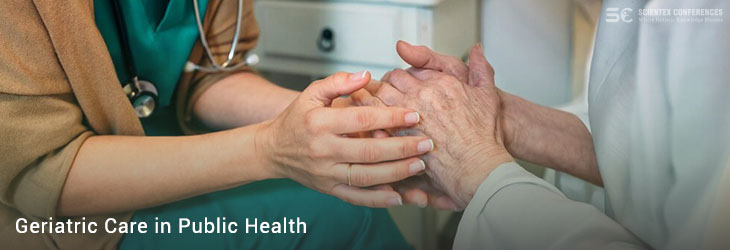Track: Geriatric Care in Public Health

Geriatric medicine is crucial in public health as it focuses on the health care needs of older adults. With the global population aging rapidly, there is an increasing demand for specialized care to manage age-related conditions and maintain the quality of life for the elderly. Geriatric medicine emphasizes preventive care, early intervention, and the management of chronic diseases, ensuring that older adults can lead healthy, independent lives for as long as possible.
Gerontology vs. Geriatrics: The High Demand in Healthcare: Gerontology and geriatrics are both vital fields, but they focus on different aspects of aging. Gerontology is the study of the aging process itself, including the social, psychological, and biological aspects. In contrast, geriatrics is a medical specialty that concentrates on health care for older adults. The rising aging population has led to a high demand for professionals in both fields, as they are essential in addressing the complex health challenges faced by the elderly.
Advances in Geriatric Diseases: Significant progress has been made in understanding and treating diseases that predominantly affect older adults. Advances in medical research have led to better diagnostic tools, treatments, and management strategies for conditions such as cardiovascular diseases, osteoporosis, and arthritis. These advances help improve the quality of life for older adults by providing more effective ways to manage chronic conditions and reduce the burden of age-related diseases.
Dementia and Geriatric Cognitive Disorders: Dementia and other cognitive disorders are major public health challenges as the population ages. These conditions can severely impact the quality of life and require comprehensive care strategies. Recent research focuses on early detection, innovative treatment approaches, and supportive care to help individuals with dementia live fulfilling lives while managing the progression of the disease.
Neuromuscular Diseases in Geriatric Patients: Neuromuscular diseases, such as Parkinson's disease and amyotrophic lateral sclerosis (ALS), are more prevalent in older adults. These conditions affect muscle function and mobility, leading to significant challenges in daily living. Advances in treatment and rehabilitation strategies are essential for managing these diseases and maintaining the independence of geriatric patients.
Geriatric Feline Diseases include conditions like chronic kidney disease, arthritis, and hyperthyroidism. Understanding these diseases can also draw parallels in managing similar conditions in human geriatrics.
Adult Geriatric Muscle Diseases: Muscle diseases in older adults, such as sarcopenia (age-related muscle loss), can lead to frailty, falls, and a decline in overall health. Research in this area aims to develop interventions, including exercise programs, nutritional support, and medications, to slow down muscle degeneration and improve strength and mobility in the elderly.
Geriatric Dentistry: Systemic Diseases: Oral health is closely linked to overall health, especially in older adults. Geriatric dentistry focuses on preventing and managing oral health issues that can contribute to systemic diseases like diabetes, cardiovascular diseases, and respiratory infections. Proper oral care is essential in reducing the risk of these diseases and improving the overall health of the elderly.
Scientific Highlights
- Public Healthcare and Management
- Role of Primary Care in COVID 19 Pandemic
- Emergency Medicine and Treatment Procedures
- Seasonal Allergies & Primary Care Treatments
- Maternal Health in Primary Care
- Mental Health, Addiction, and Public Health Awareness in Primary Care
- Global & Public Health Initiatives
- Primary Care Oncology
- Primary Care Cardiology
- Primary Care Urology
- Quality in Primary Care and Epidemiology
- Infectious Diseases and Public Health
- Surgical Care, Critical Care, and Emergency Nursing
- Primary Care Advancements in Diabetes and Obesity
- Pediatrics and Nurse Practitioners
- Geriatric Care in Public Health
- Primary Health Care and Family Medicine
- Orthopedic Primary Care
- Primary Care Dermatology
- Reproductive and Sexual Health
- Primary Care Ophthalmology
- Primary Care Dentistry
- Chronic Disease Management in Primary Care


